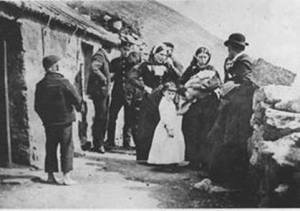The Cheviot, the Stag and the Black, Black, Oil
A year on from the referendum, Dundee Rep have brought John McGrath’s seminal 7:84 play back to the stage in their own revived, updated production which has been playing to full houses every night, but for Duncan McCabe ” it failed to weave the 21st Century narrative effectively into the original and as a result the end product just didn’t fulfill it’s full potential”.
The ecological problems caused by each of items of the title can not be underestimated, but they have too often been overlooked, and the Dundee Rep interpretation of John McGraths play was no exception.
In 1973 such omissions could be more easily understood as climate change resulting from excess carbon in the atmosphere had yet to be recognised as a threat to human survival, though oil pollution was generally recognised as a bad thing. Today it is less excusable, and as the performance sought to put the play into a post-referendum context, its inexcusable not to have at least questioned the continued exploitation of the North Sea oil reserves.
Instead, oil was a good thing as long as it’s exploitation was in the hands of the people (or was that the state?) and faith was placed in technological advances to allow even more to be extracted.
Yes campaign propaganda was regurgitated about Norway and oil fund, which is fair enough up to a point, but it is worth noting that the Norwegian oil fund, a relatively ethical investor, has recently stopped investing in an oil sector increasingly seen as a potentially toxic asset.
The portrayal of the poor oppressed oil worker, genuine enough in ’73, appeared ludicrous today with those working offshore being some of the best rewarded workers in the country.
As the opening of the play states, our future is as yet unwritten, but that future can’t be based on oil any more than it should on deer or sheep. The introduction (or discovery) of all three has had lasting effects not only on the people and their culture but also, and possibly more deeply, on our environment.
The future as far as energy is concerned belongs to renewables not oil, and the most important and pertinent aspect today, not only in the Highlands but throughout Scotland, is the need for community and public ownership of that resource and the need to end the Crown Estates control of the seabed.
 Also, given that so much of the play is about land and popular resistance to clearance, enclosure and private ownership, it was even more strange that no mention was made of the community ownership patterns beginning to emerge in parts of the Gaeltacht nor of the reasons for the current repopulation, which was mentioned, but without any context or analysis.
Also, given that so much of the play is about land and popular resistance to clearance, enclosure and private ownership, it was even more strange that no mention was made of the community ownership patterns beginning to emerge in parts of the Gaeltacht nor of the reasons for the current repopulation, which was mentioned, but without any context or analysis.
The play could have celebrated the successful struggles of communities at Assynt and elsewhere to take ownership of their land, and sought to highlight the need for more radical land reforms than proposed in the current legislation being discussed at Holyrood. I can’t imagine such key issues being omitted from a 7:84 revival of the play.
That said the performance was enjoyed by a packed house and was given a standing ovation on the night of my visit, suggesting political theatre can still exert a powerful influence. The pantomimic episodes were funny and increased the accessibility of the play which was one of the important aims of the original production – taking theatre to the people. They raised huge applause, notably with the “I’m still Yes” line, and despite being somewhat disconcerting the David Cameron intervention (even without his pig) was genuinely hilarious.
There was indeed much to be commended in the Rep production; the informal ceilidh style set and audience interaction; the music and the cast’s excellent Gaelic learning skills; the passion and commitment with which it was delivered; but ultimately it failed to weave the 21st Century narrative effectively into the original and as a result the end product just didn’t fulfill it’s full potential.
